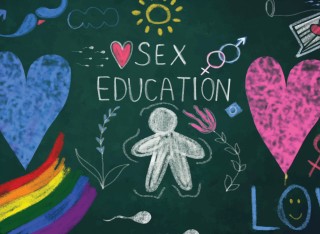
Dr Emily Setty
About
Biography
I am an Associate Professor of Criminology, researching young people’s digital sexual cultures, online harms, and the evolving landscape of Relationships and Sex Education (RSE). My work explores how young people navigate consent, risk, and intimacy in digital contexts, and how education, policy, and practice can better support them. I regularly work on collaborative research and evaluation projects with organisations tackling sexual harms, digital ethics and young people's wellbeing.
Bringing together over a decade of research, I am leading efforts to "Reimagine RSE"—moving beyond risk-focused models to more inclusive, critically engaged and participatory approaches. This builds on my extensive collaborations with young people, educators, policymakers and frontline practitioners to co-design evidence-based interventions and educational resources.
Areas of specialism
University roles and responsibilities
- Programme Director for Criminology
- MSc Dissertation Lead
Affiliations and memberships
News
In the media
ResearchResearch interests
My primary research interests relate to young people's behaviours and experiences in their youth sexual and relational cultures. I'm interested in:
- Risky, abusive and harmful sexual and relational practices;
- Victim-blaming, social shaming and bullying;
- Digitally-mediated sexual and relational culture (e.g. 'sexting', 'online pornography');
- Young people's perspectives on sexual consent, particularly in contemporary contexts; and,
- Legal and educational policy responses to young people's sexual practices.
I take a youth-led, critical, qualitative approach to the research I do.
Research interests
My primary research interests relate to young people's behaviours and experiences in their youth sexual and relational cultures. I'm interested in:
- Risky, abusive and harmful sexual and relational practices;
- Victim-blaming, social shaming and bullying;
- Digitally-mediated sexual and relational culture (e.g. 'sexting', 'online pornography');
- Young people's perspectives on sexual consent, particularly in contemporary contexts; and,
- Legal and educational policy responses to young people's sexual practices.
I take a youth-led, critical, qualitative approach to the research I do.
Supervision
Postgraduate research supervision
Currently, I am principle supervisor for: Ellen Harris, who is conducting a qualitative study of young people's perspectives on online pornography; Jude Mukoro, who is researching parents and sex education in families; and Josephine Lee, who is examining age of consent legislation in the UK and vulnerabilities to sexual harm among young people.
I am also co-supervisor Faris Haddadin, who is investigating gender, representation and climate change policy from a critical feminist perspective and third supervisor for Jo Murphy, who is researching whether and how healthcare professionals discuss sexual problems among women with diabetes.
Postgraduate research supervision
I welcome contact from prospective PhD students looking to undertake projects in my areas of interest (young people's sexual and relational cultures; sex and consent; criminal justice and educational responses to young people's sexual and relational practices; digital sexual practices and cultures) or related areas.
Teaching
I teach across criminology, sociology and research methods modules. Current and recent modules include:
As module convener:
- Crime Power and Justice (undergraduate)
- Crime and Technology (undergraduate)
- Quantitative Methods (undergraduate)
- Qualitative Methods (undergraduate)
- Youth Culture (undergraduate)
- Crime and Offending (postgraduate)
- Criminological Theories (postgraduate).
I am also preparing to deliver a new module on Victims and Victimology. I guest lecture for Birkbeck University on the Victims and Youth Crime modules (postgraduate).
I have acted as seminar tutor for the following:
- Criminological Theories (undergraduate)
- Youth Culture (undergraduate)
- Crime and Media (undergraduate)
- Hate Crime (undergraduate)
- Youth Crime and Control (undergraduate)
- Quantitative Methods (undergraduate).
Publications
Educational interventions on youth sexting often focus on individual sexters or would-be sexters, and are driven by the aim of encouraging young people to abstain from producing and sharing personal sexual images. This approach has been criticised for failing to engage with the complex sociocultural context to youth sexting. Drawing upon qualitative group and one-to-one interviews with 41 young people aged 14 to 18 living in a county in south-east England, I explore young people’s perceptions and practices surrounding sexting. By taking a grounded theory approach to the research, I reveal how young people’s shaming of digitally mediated sexual self-expression shaped and was shaped by a denial of rights to bodily and sexual autonomy and integrity. This denial of rights underpinned harmful sexting practices, including violations of privacy and consent, victim blaming, and bullying. I conclude that responses to youth sexting should attend to this broader youth cultural context, emphasise the roles and responsibilities of bystanders, and encourage a collectivist digital sexual ethics based upon rights to one’s body and freedom from harm (Albury, New Media and Society 19(5):713–725, 2017; Dobson and Ringrose, Sex Education 16(1):8–21, 2015).
Young men tend to be constructed as being at low risk of harm and able to extract value from sexting, compared to young women. Drawing upon findings from a qualitative study exploring practices and perceptions of sexting among 14–18 year-old participants in southeast England, I discuss the meanings and norms surrounding young men’s sexting practices. I outline how these meanings and norms underpinned perceptions regarding the value available to young men through sexting. Young men were not, however, equally able to extract value and social capital through sexting, and participants discussed examples of the social shaming of young men who sext. I discuss how young men took up diverse positions with regard to masculine heterosexuality within youth sexting culture, in which they reworked and challenged the ideals and assumptions inherent to ‘hegemonic masculinity’. I draw two conclusions: firstly, it should not be assumed that young men are inherently able to gain value through sexting; secondly, narratives of risk and shame may mean that while young men distance themselves from sexting, gendered assumptions and inequalities regarding bodily and sexual expression remain.
Youth sexters are considered vulnerable to privacy violations in the form of unauthorized distribution, in which sexts are distributed beyond the intended recipient without the consent of the subject. This article draws on group and one-to-one interviews with young people 14 to 18 years of age living in southeastern England to show how they constructed privacy rights and obligations in sexting. The analysis suggests that their constructions were shaped by individualistic orientations to risk management, social meanings of privacy in the “digital world,” and broader norms and values regarding gender, trust, and approved conduct of behavior in intimate relationships. The article concludes that educational and community interventions on sexting with young people should deconstruct and challenge narrow ethical frameworks regarding privacy rights and obligations, and young people’s tendency to blame and responsibilize victims of privacy violations in sexting.
The present paper explores how young people construct gendered social meanings and cultural norms surrounding sexual and bodily expression in youth sexting culture. Previous research suggests youth sexting is a gendered phenomenon in which young men are able to seek social capital through sexting, whereas young women are subject to social shaming and harassment. Drawing upon findings from group and one-to-one interviews with 41 young people aged 14–18, I show how constructs of risk, shame, and responsibility operated along gendered lines. Young people attributed agency and legitimacy to young men’s sexual practices, whereas young women were disempowered, denied legitimacy, and tasked with managing gendered risks of harm in youth sexting culture. I discuss how young women negotiated and navigated risk and shame and, in some instances, made space for safe, pleasurable sexting experiences despite and within these narratives. The accounts of two young women, who shared experiences sexting and social shaming, are presented to show some of the ways young women make sense of social meanings and cultural norms on individual and interpersonal levels. I conclude that challenging gendered harm requires a (re)legitimisation of feminine sexuality and bodily expression away from narratives of risk and shame.
This thesis explores young people’s perceptions and practices surrounding ‘youth sexting’, particularly regarding privacy and consent. Youth sexting – involving the production and exchange of sexual images or messages via mobile phones and other communication technologies – has attracted media attention, public concern, and research and policy focus for some time, particularly regarding the perceived harmful nature of the practice (Crofts et al., 2015). This thesis situates harmful practices in terms of breaches of privacy and consent. The research is used to advocate for progressive, harm-reduction approaches to responding to youth sexting that centralise ethics, justice and equality, and give rights to sexual and bodily expression and exploration, as well as freedom from harm. Group and one-to-one interviews with young people revealed narratives of individualism and responsibilisation regarding harmful sexting practices. Intertwined were moralising discourses about harm-avoidance, which underpinned a demarcation of deserving and undeserving victims, and promoted victim-blaming. Analyses revealed however, that risk and harm was not inherent to sexting and was shaped by norms and standards surrounding gender and sexuality, and local peer group dynamics and hierarchies. The designation of some forms of bodily and sexual expression as shameful and illegitimate shaped harmful practices and were incorporated into young people’s self-concepts in ways that both reproduced and resisted established systems of meaning. The findings suggest that rather than being caused by technology, youth sexting should be understood as a complex, negotiated practice situated within young people’s peer, digital, relational, and sexual cultures. The thesis explores young people’s perspectives on addressing youth sexting, and concludes by emphasising the need to disrupt and challenge the meanings underpinning shame and stigma, and the responsibilisation of individuals to deal with inequality and harm.
This book draws upon interviews with teenage young people to explore their perspectives on risk and harm in ‘youth sexting culture’. It focuses specifically on digital sexual image-sharing among young people. It contextualises the findings in terms of the wider literature on youth sexting and the broader theoretical and conceptual debates about the phenomenon in public and academic spheres.
The book explores young people’s attitudes toward and experiences of non-consensual sexting and privacy violations. It analyses the broader sociocultural context to youth sexting and discusses issues such as victim-blaming, social shaming and bullying within youth sexting culture. It reflects upon the nature of predominant approaches to responding to youth sexting (both legal and educational/pedagogic) and identifies what young people want and need when it comes to addressing risk and harm, based upon what the evidence shows about their situated realities and lived experiences.
Public and academic discourse surrounding youth sexting, and the legal and educational policy responses to the phenomenon have developed and changed over recent years. The field is increasingly contested and there are ongoing debates about how to protect young people from harm while respecting their rights as individuals and encouraging them to develop into ethical sexual citizens, including within digital environments. This book presents empirical data to show how risk and harm in youth sexting culture is predicated upon a denial of rights to sexual and bodily integrity, autonomy and legitimacy.
Sexual consent has increasingly become a central component of Relationships and Sex Education. This paper draws upon findings from qualitative research conducted with teenagers in England, which explored their perspectives on consent within their contemporary youth sexual cultures, including in digital (sexting) contexts. The findings suggest that young people’s definitions of consent often did not correspond to the socially- and contextually contingent realities of negotiating and establishing consensual sex(ting). While young people’s contemporary sexual cultures may look somewhat different, longstanding gender norms and sexual scripts shaped their attitudes towards consent. The implications of the findings for RSE are discussed, including the need for more collaborative dialogue and exchange between educators and learners that engages with the situated realities of contemporary youth sexual culture.
This paper draws upon research conducted in a co-educational independent boarding school in England to explore the role of pornography in students’ school-based sexual cultures. Drawing upon Mechling’s conceptualization of boarding schools as ‘total institutions’, I explore how pornography acted as both ‘play’ and ‘ritual’ through which participants asserted agency and control while producing a gendered social order surrounding sex and sexuality. Participants who spoke about pornography drew upon dominant understandings of masculine and feminine (hetero)sexuality when positioning themselves and one another regarding pornography. They tended to construct viewing pornography as a ‘typical’ and ‘normal’ part of masculine (hetero)sexuality but as antithetical to feminine (hetero)sexuality. Some of the boys expressed ambivalence and uncertainty about pornography, but this was often grounded in taken-for-granted gendered constructs about sexual performance and accomplishment. Socially approved expressions of agency and control within the research environment were, therefore, both reflective and constitutive of a gendered and heteronormative social order. I suggest that sex education should attend to the role that pornography plays as a cultural resource through which young people construct, express and designate gendered sexual subjectivities and social roles.
This paper presents an examination of ‘frexting’ (‘friend’ + ‘sexting’), which is defined as the exchange of personally-produced intimate images among friends. It draws upon accounts of frexting shared by teenage girls during a 2016 study investigating sexting conducted in Surrey, England. Frexting is theorised as a form of homosociality among girls and explores the extent to which and how it reflects, reproduces and subverts the dominant gendered social order within youth digital intimacies. The analysis suggests that while frexting involves intimate self-representation away from the male gaze, it reflects and reinforces a post-feminist cultural landscape characterised by (self-)scrutiny and regulation of girls’ bodies and bodily self-representations. Frexting worked to demonstrate an authentic, relaxed, carefree and confident but, importantly, non-sexual sensibility, with implications for who and what constitutes legible participation. While subverting normative interpretations of girls’ bodies as inherently, and problematically, sexual, frexting did not fundamentally trouble the post-feminist cultural landscape within which the girls were operating. The paper concludes by arguing that for frexting to become a truly emancipatory endeavour, it is necessary to dismantle the socio-cultural context that restricts and regulates girls’ abilities to relate to and represent their bodies.
Young people’s use of digital and internet technologies, particularly the risks and harms they face online, continues to be of public and policy concern. Adult stakeholders – parents, teachers, law enforcement, youth practitioners, policy makers and researchers – are, in various ways, mindful of how young people can be protected from so-called online harms while not unduly curtailing their opportunities to reap the benefits of being online. The UK government’s Online Safety Bill seeks to do just that (Department for Digital, Culture, Media and Sport, 2021) and since September 2021 it has been mandatory for most schools in England to educate young people about digital safety as part of the newly introduced Relationships, Sex and Health Education (RSHE) curriculum (Department for Education, 2019). This article does not directly engage in a critique of the specifics of this policy and practice agenda (see Nash, 2019, for a dissection of the issues with the online harms policy proposals). Instead, I discuss findings from some recent research conducted with young people about their perspectives on online harms in order to explore how we should seek to understand and respond to the realities of young people’s digital lives, in all their complexity and heterogeneity.
On the basis of the findings, I argue that individualistic, technical and decontextualised solutions to online harms will not suffice in light of, first, the high levels of normalisation (and fatalism) surrounding potentially harmful online experiences; and, second, the social and structural contingencies that shape young people’s digital lives and thus give rise to an unequal terrain of risk. It is urgent that educational interventions raise young people’s critical consciousness about the nature of risk and harm online, not necessarily to solve the issues but to enable them to connect what they see and experience online to wider inequities and injustices. In so doing, interventions can support their resilience in a way that is sensitive to the differential risks that young people face and can encourage reporting and positive models of bystander intervention online.
The previous indicator looked at adolescents’ experiences of online harm. It includes data from the Internet Watch Foundation (IWF), which shows that increasing numbers of online sexual abuse images involving adolescents are being identified. This rise is partly driven by an increase in ‘self-produced’ content, where young people had taken and shared images themselves. Here Dr Jenny Lloyd and Dr Emily Setty look at why adolescents sext, when this behaviour becomes harmful and what can be done to tackle it.
Young people encounter and experience both risks and opportunities when participating as actors and interactors in online spaces. Digital skills and resilience are considered important parts of a “rights-based” approach to keeping young people “safe” online in ways that enable them to avoid harm while benefiting from the opportunities. The present paper discusses findings from focus group research conducted in England with 60 young people aged 13 to 21. The research explored their perspectives on responding to different online harms, including online hate, unwanted sexual content, and unrealistic body- and appearance-related content. The findings are discussed in terms of scholarship on digital citizenship, specifically regarding the social, affective, and technical dimensions of online life and the skills required for resilience. The analysis suggests that there was a tension between young people’s individualistic responsibilisation of themselves and one another for responding to risk online and the socio-emotional aspects of online life as perceived and recounted by them in the focus groups. It is concluded that a youth-centred approach to resilience is required that encapsulates the multidimensional nature of encountering, experiencing, and responding to risk online.
Young people’s socio-sexual lives and development have become increasingly digitally mediated over recent years. There are implications for classroom-based Relationships, Sex, and Health Education (RSHE), which has recently been made mandatory in most state-maintained schools in England. The evidence base pertaining to good practice in RSHE is extensive and identifies a need for RSHE to be relatable and relevant to learners, and to position learners as active participants in the pedagogic process. Typically, young people’s use of digital media is considered a risk or problem to address in RSHE and this includes their use of digital media for formal and informal learning about sex and relationships. This paper explores the potential value of digital media to classroom based RSHE. It considers how using digital media in the classroom could help to convey material in a relatable and relevant way, including how the ‘influencer model’ may represent a new opportunity for or form of peer delivered education. It also discusses the value of strengthening young people’s skills in identifying reliable and trustworthy content and in applying the content to their own lives, which may necessitate opportunities for independent and self-directed learning away from the classroom.
This paper examines the participation of children and young people within government consultation processes. It considers the recent Department for Education consultation on its statutory guidance for schools for Relationships and Sex Education in England. The paper is based on a Freedom of Information request for the consultation responses categorised as from ‘young people’. We identify two issues in our interrogation of the data. First, there is evidence that a substantial proportion of responses were not submitted by young people. Second, the consultation approach did not include all the features necessary for meaningful consultation. We consider the implications for the youth consultation on policy matters that affect them.
In England, the Children and Social Work Act (HMSO, 2017) bestowed compulsory status on relationships and sex education (RSE), which means that young people’s right to receive RSE has been codifed in law. This paper analyzes how this right is upheld and enacted within the Department for Education (DfE) (2019) statutory guidance on RSE for schools in England. The analysis suggests that the guidance features contradictory discourses in which young people’s rights are ostensibly advanced, but remain structured by adult-centric, heteronormative understandings of sex and relationships. It upholds a decontextualized and legalistic approach to rights, responsibilities, informed choice, and decision making. A narrow conception of rights is particularly evident regarding young people’s digital sexual cultures, which are predominantly framed in terms of risk and harm. We argue that scholars should investigate how educators are designing and delivering RSE in light of the guidance, and the opportunities for and obstacles to a genuinely “rights-based” approach to RSE. While the policy discussed in this article is specific to England, the discussion has wider relevance for practitioners and policymakers across cultural and geographic contexts as it draws upon a model for analyzing how young people’s sexuality is presented and addressed in legislative and curricular documentation.
This chapter discusses two qualitative studies exploring youth intimate image sharing, conducted with 191 British young people over a four-year period. We explore a discursive absence of consent in the data and discuss how image sharing occurs within inequitable gendered cultures of normalised online sexual harassment and abuse. We describe the technological affordances that create temporal and material endurance of images and explore how these affordances compromise consent in digital contexts in gender-specific ways. We discuss the pressure on girls to send nudes and how boys’ desire for girls’ nudes also drives transactional, uninvited “dick pics.” We then consider the non-consensual sharing of images of girls and boys and demonstrate how the implications are often worse and longer lasting for girls. We show how the increased risk of non-consensual sharing of girls’ nudes led to heightened responsibilization of girls for the life of their images, as well as long-lasting feelings of regret and shame for creating and sending nude images of their bodies. We argue for a change in educational messages around sexual consent to explicitly address cultures of normalised abuse that surround the life of images in digital contexts.
Consent in Boys’ Socio‑Sexual Cultures and Subjectivities
Educating boys about consent in schools in England is required as part of the now-statutory Relationships, Sex, and Health Education curriculum and, moreover, is considered important for addressing sexual violence, abuse, and harassment among young people. The present paper draws on qualitative data collected in three schools in southeast England to explore how boys are being taught about consent and how they relate to and interpret educational messages about consent in terms of their sociosexual subjectivities and peer sexual cultures. Data was collected during May–June 2022 through classroom observations, focus groups with boys, and discussions with teachers in a co-educational academy, a boys’ academy, and a boys’ independent school, all in southeast England. The data suggests that while typical consent education messages may rationalise or provide a ‘road map’ for consent, the boys felt uncertain and anxious about navigating the perceived, often anticipated, realities of youth sexual culture. The framing of sexual activity as only consensual, and thus legitimate, if there is a clear and direct yes, conficted with these realities. As supposed initiators of sex, as masculine heterosexual subjects, the boys felt a responsibility for obtaining consent yet seemed to lack confdence regarding the socio-afective skills required for doing so. The paper calls for an integrated model of consent education that addresses knowledge, skills (including emotional literacy), and the normative contextual contingencies that constrain the operation of free choice.
Educating boys about consent in schools in England is required as part of the now-statutory Relationships, Sex, and Health Education curriculum and, moreover, is considered important for addressing sexual violence, abuse, and harassment among young people. The present paper draws on qualitative data collected in three schools in southeast England to explore how boys are being taught about consent and how they relate to and interpret educational messages about consent in terms of their sociosexual subjectivities and peer sexual cultures. Data was collected during May–June 2022 through classroom observations, focus groups with boys, and discussions with teachers in a co-educational academy, a boys’ academy, and a boys’ independent school, all in southeast England. The data suggests that while typical consent education messages may rationalise or provide a ‘road map’ for consent, the boys felt uncertain and anxious about navigating the perceived, often anticipated, realities of youth sexual culture. The framing of sexual activity as only consensual, and thus legitimate, if there is a clear and direct yes, conflicted with these realities. As supposed initiators of sex, as masculine heterosexual subjects, the boys felt a responsibility for obtaining consent yet seemed to lack confidence regarding the socio-affective skills required for doing so. The paper calls for an integrated model of consent education that addresses knowledge, skills (including emotional literacy), and the normative contextual contingencies that constrain the operation of free choice.
Romantic and intimate relationships are crucial for the socio-emotional development of young adults. However, the Covid-19 pandemic and the resulting ‘lockdown’ restrictions imposed by the UK government limited opportunities for in-person relationships in England during 2020-21. This paper discusses young adults’ experiences of their relationships during lockdown, based on findings from 36 qualitative interviews conducted during 2021-22. The data suggests that relationships were shaped by socially and contextually contingent processes of meaning making and experience. Lockdown served as a defining condition, which constrained and reshaped these processes. The findings emphasise the importance of understanding relationships as entailing dynamic interactions between individual subjectivity, interpersonal experiences, and social norms. Identifying the evolving contextual conditions in which these processes occur is vital. While this study specifically examined the impact of lockdown, its implications extend beyond through shedding light on how young adults navigate social conditions and make choices for themselves and their relationships.
Young people’s perspectives on the potentialities of and problems with Relationships and Sex Education (RSE) in England are well documented. This article shares insights from a co-design project conducted with young people and third-sector experts during 2020/21 which sought to identify and develop recommendations for schools regarding the design and delivery of critically informed RSE that engages with the realities and complexities of youth sociosexual life and development. The article discusses findings from workshops pertaining to how RSE can address the ‘ecosystem’ of young people’s sociosexual lives and development; judgment and shame within and beyond the classroom; safe, constructive, and inclusive teaching and learning; and inclusivity and cultural sensitivity. The challenges of designing and delivering safe, inclusive, and meaningful RSE for learners, that upholds and supports their development as sexual citizens, are acknowledged and addressed.
Young people’s digitally-mediated interactions entail negotiating co-existing risks and opportunities. This paper discusses youth perspectives on these risks and opportunities, based on data from focus groups conducted with 12–21-year-olds in England. Analysis of examples of digitally-mediated interactions shared by participants suggests that pursuing opportunities involved or created risk for oneself and/or others, while motivations to pursue opportunities were shaped by risks resulting from the actions of others. Flows of risk and opportunity were, therefore, reciprocal across a dynamic continuum of ‘digital’ – ‘non-digital’ contexts and relational both for and between young people. It is argued that a reciprocal and relational conceptualisation of ‘post-digital’ negotiations of risk and opportunity among youth facilitates critical engagement with their accounts of their online lives as well as identification of the interconnections between individual, interpersonal and community-ethical spheres of meaning and experience.
Educating young people about sexual consent aims to help them develop healthy relationships and prevent sexual harm. Yet, there remains no consensus on how to define consent nor the connection between consent and sexual harm. This article discusses findings from qualitative research conducted with young people in England that has explored issues of sexual consent. It engages with tensions around the so-called ‘grey areas’ and oft-critiqued ‘miscommunication model’ of consent and suggests that some form of ‘miscommunication’ may underpin some, albeit not all, experiences of sexual harm among young people. Young people may experience problems articulating and interpreting consent not because of malintent or substandard or disparate communication skills but because of interpersonal and sociocultural power dynamics that constrain the communication and operation of consent. Consent education needs, therefore, to support young people develop the socio-emotional skills and literacy required to navigate gendered and heterosexual (inter)personal pressures, expectations, and sexual scripts. It should involve active participation of young people whereby they identify the conditions in which sexual activity unfolds and the power dynamics that constrain the operation of consent.
Examines online harm as it pertains to children and young people within the UK context
Draws upon children’s and young people’s views on online harms through qualitative research studies
Critically examines these perspectives in the context of legal, policy and regulatory debates and developments
This paper discusses findings from interviews conducted in England with 15 self-identified feminist mothers about sex and relationships education in the home. Participants’ understandings and enactments of being sexuality educators for their children involved what they described as open and honest ‘sex positive’ communication with their children, based on their subjective views about gender and sexual rights, safety and wellbeing. Participants were concerned about protecting their children from oftentimes gendered risks of judgement shame and abuse. Feminist sex and relationships education in the home for these mothers was shaped, and sometimes constrained, by the gendered sociocultural conditions of their children’s lives. Implications are discussed regarding the need for self-reflexivity amongst feminist mothers, supported by collaborative local and community educational initiatives to identify and collectively tackle the social contexts in which risks and harms arise for children.
The lockdown imposed in England in response to the COVID-19 pandemic involved an unprecedented ‘shift to digital’, including in relationships between non-cohabiting individuals. This article examines young people’s perspectives on and experiences of using networked communication technologies (NCTs) in romantic relationships during lockdown, based on 14 focus groups (n = 80) and interviews (n = 38) conducted with young people in England during 2021–2022. Using critical realist theory, we identify interplays between lockdown as a condition, NCT affordances and wider norms, meanings and expectations for relationships. Participants were ambivalent about interacting online during lockdown, with interlocking risks and opportunities specific to and transcending lockdown as a condition. Implications are discussed regarding meanings and experiences of post-digital relationships for young people, both during and post-pandemic.
Sexual and gender-based violence (SGBV) in schools in England is a pressing concern, especially since the ‘Everyone’s Invited’ movement laid bare the extent of the problem across the country. This article analyses the national policy context, asserting that SGBV is a systemic problem rooted in young people’s school and online peer cultures that requires transformative solutions, involving active youth participation. We introduce and explore the utility of the concept of postdigital sexual citizenship. We contrast this approach with the prevailing behavioural science ‘nudge’ philosophy of government policy making and societal discussions on youth sexuality and rights currently shaping Relationships and Sex Education (RSE) discourse and policy in England. Challenging adult-centric, top-down methods and instead empowering young people as post-digital sexual citizens entitled to comprehensive RSE is vital. While our focus is on England, the arguments apply globally to jurisdictions tackling SGBV in schools.
Youth produced sexual imagery (YPSI) has, for some time, been of concern to police, schools, and policymakers. There have been various iterations of policy and practice designed to address YPSI over the previous decade, with increasing nuance and awareness about the different forms of YPSI and the distinctions between ‘developmentally normative’ consensual image sharing between similarly aged peers and aggravated or abusive image sharing. This chapter examines the implications of policy and practice in England surrounding YPSI for the prevention, reporting, and response to abusive image sharing among young people. It suggests that ongoing tensions in the aims and nature of the approach, in England but also comparable jurisdictions elsewhere, coupled with sociocultural, structural, and systemic victim-blaming and barriers to reporting and challenging abusive image sharing, means that it is not being sufficiently recognised or addressed in policy and practice. Suggestions are made for an improved systems response that disentangles non-consensual and abusive sharing from consensual sharing; challenges all forms of victim-blaming; and takes a holistic approach to addressing the sociocultural contextual causes of abusive image sharing and the reluctance to report and challenge abuse, including as upheld and perpetuated within the structures of the systems themselves.
There were limited opportunities for in-person social, intimate, and sexual interactions in England during 2020–2021, due to restrictions imposed by the UK government in response to the Covid-19 pandemic. While previous studies examined the effects of lockdown on intimate relationships, there is less qualitative research regarding young people’s perspectives on and experiences of digitally mediated intimacy (sexting) during the period. This paper discusses findings from focus groups with 80 adolescents and interviews with 38 young adults that explored the topic. Analysis identified a normalization of non-consensual distribution of intimate images within adolescent peer culture and a reluctance to report or intervene in response to incidents of non-consensual distribution that are witnessed or experienced. The adolescent girls and young adult women also described other forms of unwanted and invasive image-sharing and requests for images. Young adults held various perspectives on sexting during lockdown, with some describing sexting as unfulfilling and/or “risky” and others sharing experiences of using sexting to generate intimacy and, among some, engaging in unwanted sexting with partners. By considering both adolescent and young adult perspectives obtained through focus groups and interviews, the study highlighted how group-level norms and meanings surrounding the risks and rewards of sexting may be reproduced or reworked as individuals transition from adolescence to young adulthood. The study underscores the need to support adolescents and young adults in cultivating healthy digital sexual cultures and interpersonal relationships.
Young people today are participating in and navigating a sexualised digital media landscape. The two most prominent aspects include ‘pornography’ – which is sexually explicit material consumed by individuals – and the production and exchange of personal sexual content (for example, messages, images and recorded or live videos), which is often colloquially referred to by adults as ‘sexting’. Digital media has made sexual content ubiquitous and easy to access and produce, which contrasts with the situation for previous generations whereby a more deliberative approach to seeking out such content was required. Digital sexual content (both consumed and produced) is a normalised, almost mundane part of day-to-day life for young people online. Anyone – young or old – can access, consume and participate in sexualised digital media practices, but it is particularly important to consider young people’s perspectives and experiences because it forms part of how they learn about and experience sex and relationships as developing individuals in the contemporary digital era. In this article, I draw upon findings from studies conducted with young people to explore how we may wish to understand and respond to the realities of contemporary youth digital sexual culture, in all their complexity and heterogeneity.
This chapter focuses on young people's engagement with sexually explicit content online, focusing on the legal and ethical challenges in research involving minors under 18. It considers the formal and informal adult responses to young people’s online sexual behaviors and the impacts of these responses on young people’s protection and participation rights. The chapter reflects on the authors’ research experiences using and avoiding the use of visual methods. Through a case study of visual methods in researching image-based sexual abuse among English adolescents, the authors argue that visual methods offer an opportunity to empower young people and to generate insights to support safeguarding. While visual methods are valuable, their use requires careful consideration of institutional and socio-political contexts to ensure ethical and effective research practices.
This paper examines the policing of harmful sexual behaviour (HSB) among young people in schools, drawing on qualitative research conducted with police and schools in southeast England. Utilising a Foucauldian surveillance perspective, we explore the challenges police experience in balancing punitive measures with relationship-building efforts. We highlight contradictions between policing objectives and strategies, with police engagement often emphasising surveillance, intelligence gathering and detection, including among officers endorsing relationship-based practice with young people. The overarching concern with behaviour management and discipline of young people in schools, combined with inadequate training and resourcing, perpetuates authoritarian policing practices, with implications for police–youth relations. We identify how tensions between deterrence and trust play out through a wider crisis of legitimacy regarding the capacity for legal frameworks and criminal justice to adequately capture and respond to HSB. We suggest these limitations undermine young people's rights, erode trust between young people and police, and ultimately compromise safety through hindering the effectiveness of HSB prevention and response efforts.
A systematic literature review was undertaken to investigate the cultural conflicts that arise in secondary school-based sexuality education programmes and how stakeholders respond to and navigate these conflicts. This review is reported according to PRISMA guidelines. After applying the inclusion and exclusion criteria, a final selection of 23 documents from the literature was made for analysis. Thematic analysis of the documents revealed four key themes. The first theme examines the interplay between culture and conflict in sexuality education, highlighting how cultural contexts can trigger or oppose it. The second theme focuses on the roles of stakeholders in cultural conflicts, exposing power imbalances within their influence on youth sexuality education. The third theme explores diverse stakeholder responses to cultural conflicts, ranging from silence to negotiation and conflict-informed teaching approaches. Lastly, the fourth theme investigates how conflicts shape and drive transformative changes in sexuality education, including the adoption of innovative approaches and the recognition of it as a human right. In conclusion, this article outlines the implications of these identified themes for sexuality education. (PsycInfo Database Record (c) 2025 APA, all rights reserved)















